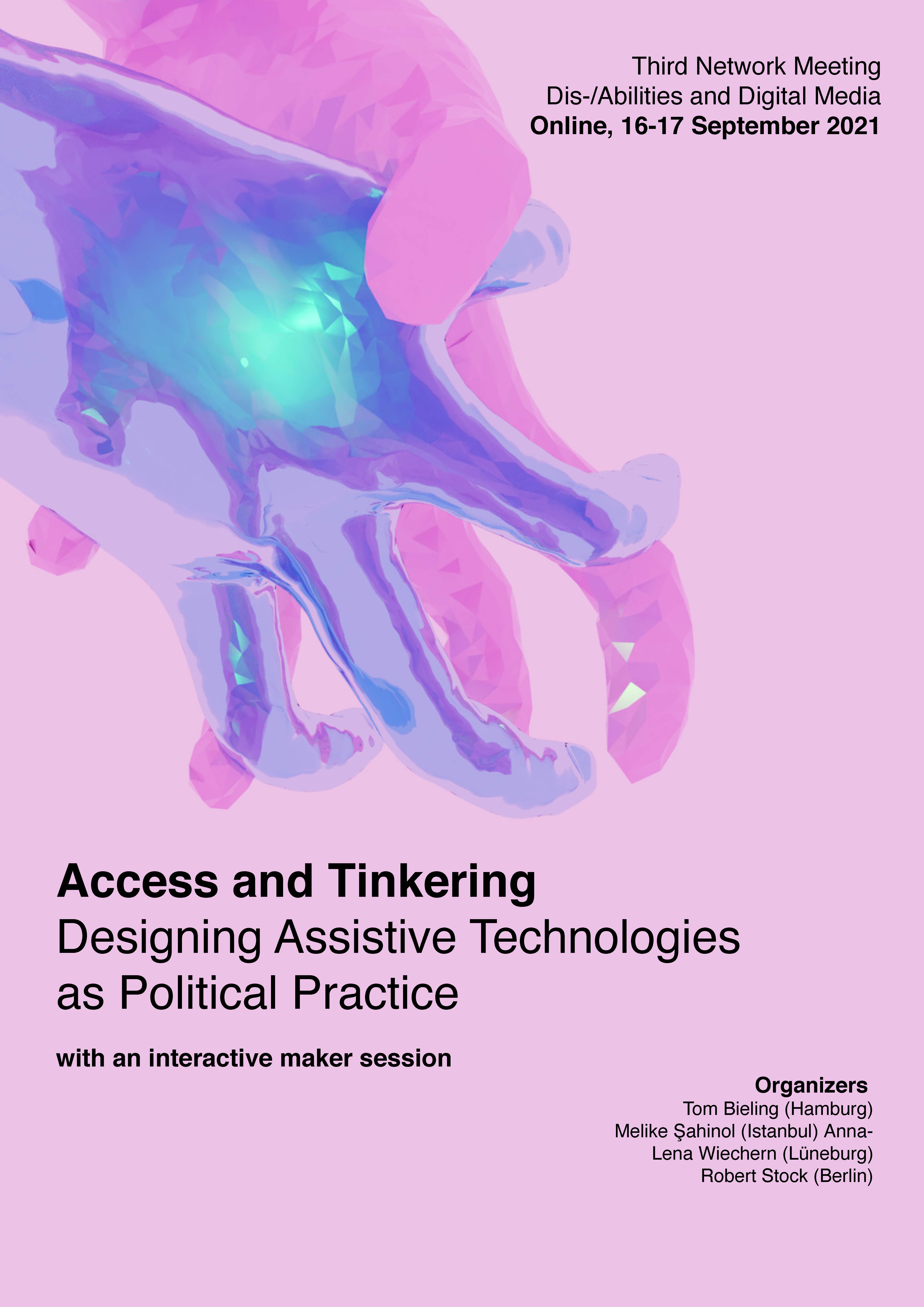with an Interactive Maker Session
3rd meeting of the DFG Research Network Dis-/Abilities and Digital Media
I am pleased to share our workshop/ symposium program with you, that I am co-organizing with Tom Bieling (Hamburg), Anna-Lena Wiechern (Lüneburg) and Robert Stock (Berlin).

Workshop
By drawing on STS, Crip Technoscience (Hamraie/Fritsch 2019) and approaches from participatory design research and practice, this event discusses body-technology relations from inter-, transdisciplinary and cross-cultural perspectives. We argue in favor of extending the concept of materiality beyond the borders of the physical object to include practices and relations and consequently, want to question common concepts of norm, normality, and normativity. Because these notions are not only entangled with artefacts but also with their design and the practices they involve, which include bodies embedded in historical, cultural, infrastructural and institutional contexts. Thus, they can be considered situated (Haraway 1988). As a result, questions and demands for inclusion and social participation, too, become virulent (Star 2017, 1999; Winner 1980) and have been problematized as politics of assistive artefacts (Mills 2012). In sum, we propose to re/frame technology and body (differences) as interacting entities within societies.
The event aims to think critically through a theoretical framework in the context of dis/abilities that recognizes assistive technologies as political as well as situated interconnections. On this basis, we endorse to reflect on infrastructures of design for questions of inclusion and participation – cross-cultural, inter- and transdisciplinary. Reflecting on open source practices in medical and assistive technologies (e.g. 3D printing) will allow us to question the effects of heterogeneous interests, economic implications and everyday affordances of socio-material assemblages produced within the frameworks of participatory design research.
Interactive Maker Session
In order to integrate body-technology relations from interdisciplinary standpoints as well as an awareness for the need for participatory design research as a policy of inclusion in social contexts, a maker session will be organized. For this purpose, hands-on kits will be sent out to participants after prior registration. The kits serve to didactically convey an understanding of how technological innovations and design issues related to body modifications or diversely enabled bodies are viewed both in terms of their effects on society and as shaped by societal norms, values, and frameworks.
The number of kits is limited. If you are interested, please register by 10 August 2021.
Please contact sahinol[at]oiist.org until 10 August to receive a kit.
Accessibility

German Sign Language Interpretation will be provided during the public talks.
Please let us know about any further accessibility requirements by 15 August 2021 by emailing robert.stock[at]hu-berlin.de
Registration
Please sign up through the Zoom registration page linked below to receive access to the public discussion, maker session and keynotes: Click here.
Organized by
Tom Bieling (Hamburg), Melike Şahinol (Istanbul), Anna-Lena Wiechern (Lüneburg), Robert Stock (Berlin)
*
*
PROGRAM
Thursday, 16 September 2021
All times are CEST
9:00-12:00am (CEST)
Internal Network Meeting
–
1:30-3:30pm (CEST)
Maker Session
Assembling 3D-printed prosthetic dummy “Phoenix Hand” (provided by Lars Thalmann, e-nable Germany)
[Registration necessary]
–
4:00–5:30pm (CEST)
Roundtable Discussion
[open to public]
“DIY-Prostheses, Toys and Remote-Prototyping”
Thomas Miebach (solicited) and Daniel Wessolek (Open Health HACKAcademy)
Zeynep Karagöz (ROBOTEL/ e-nable, promaker)

–
7:00–8:30pm (CEST)
Keynote I
[open to public]
Assoc Prof Aimi Hamraie, PhD (Vanderbilt University)
“Crip Making”

*
*
Friday, 17 September 2021
9:00-12:00am (CEST)
Internal Network Meeting
–
1:30-3:00pm (CET)
Presentation
[open to public]
Tomás Sánchez Criado, PhD (Humboldt University)
“The Pharmakon of Collaboration: Activating Research with the Independent Living Forum”

3:30-5:00pm (CET)
Keynote II
[open to public]
Prof Dr Anne Waldschmidt (University of Cologne)
“Inclusion – Accessibility – Normality: Some Remarks from a Dispositif-Analytical Perspective””

*
*
Funded by

For more information about our DFG Research Network Dis-/Abilities and Digital Media visit: https://dis-abilities-and-digital-media.org/index.php/en/project